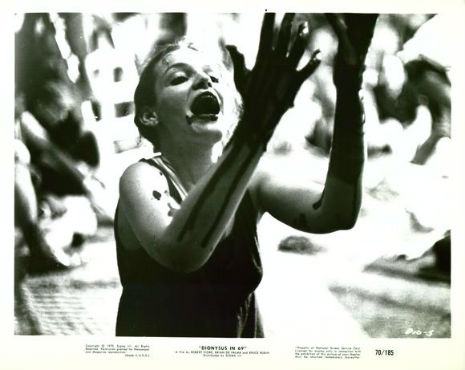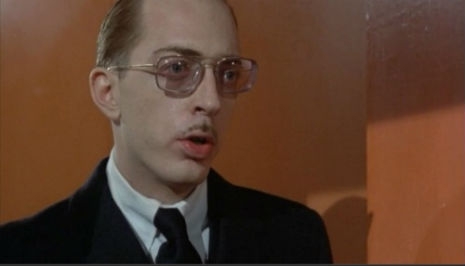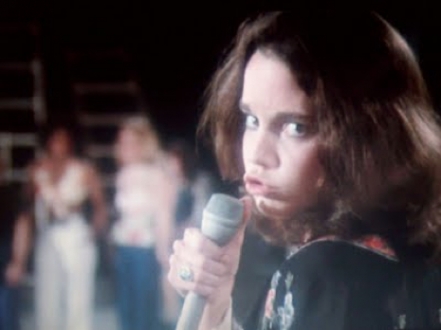
Terms like “interactive theater” may give you visions of cheesy plays, bad magic acts and pretentious performance art. However, if you root around to the modern day origins, with such art constructs as the Theatre of Cruelty, there are rewards to be found. Namely, Brian DePalma’s Dionysus in ‘69. “Dionysus” is part filmed documentation of a live theater event and part experimental cinema, complete with being shown mostly in split-screen. (Predating 1973’s dual-vision feature Wicked Wicked, starring Tiffany Bolling and Ed “Kookie” Byrnes, by at least three years.)
The final result feels like Antonin Artaud meets Charlie Manson, with a growing sense of witchiness that lays dormant until a little past the half-hour mark. It snakes out and slowly wraps around you until the shocking and darkly funny ending. Adding to the Helter Skelter vibes, intentionally or not, all of the Dionysus devotees could be siblings of Atkins, Fromme, Watson, Beausoleil, Krenwinkle, Van Houten, et al. The only thing missing is a reference to the Beatles’ White Album. (Though if my had my druthers, I would use a Mort Garson album for the score. Though the live soundtrack, ranging from loose music to chants, is quite fine too.)
The first half hour, while good, comes across as what you would expect from a bunch of college students and actors putting on an alternative version of the famous Greek play, “The Bacchae.” It’s all half nudity, smiles, chanting, with the proceedings taking place in a large garage rather than a traditional stage set-up. It’s not until our lead Dionysus (the late, great William Finley) breaks the fourth wall and speaks to the audience, introducing himself as the former William Finley and is now the “reborn” Dionysus. We then get to witness the surrealistic ceremony of squirming bodies and our lead deity born.
The seemingly sweet hedonism quickly has a menacing flower-child in the form of a slight but strong in presence Pentheus (William Shepherd, whom DePalma fans might recognize as the freak-out concert goer in the finale of “Phantom of the Paradise”). Initially lurking around the pseudo-orgiastic goings-on like a bad penny until he makes himself known, revealing his intentions to murder Dionysus. But, it is only a matter of time before Pentheus is seduced by the lanky, golden-curled god. As the seduction happens, the sexuality and vibe in general goes from hippie-free-love to something in the milk ain’t right. At one point, audience members get involved in the breathing-tomb of flesh, while cult-like humming and chanting can be heard in unison for minutes on end in the background. It’s hypnotic and pregnant with ill-will until the inevitable death of Pentheus, as he is ripped apart by Dionysus’s followers.
But that’s not the real end and thanks to the glory of YouTube, you too are privy to the brilliant and dark as dirt finale. Despite the ancient roots of the play, Dionysus in ‘69 is more en point with the cultural and social atmosphere of the late 1960’s. Which is terribly fitting since no one quite did witchy and disturbing like the ancient Greeks. This is a tradition beautifully and faithfully upheld in DePalma’s infant work here. Now, if only more theater pieces were this good, then or now.







